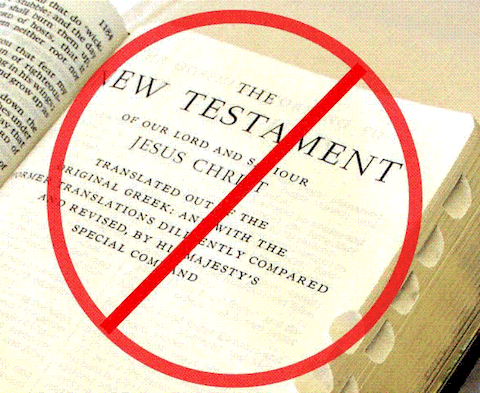
1001 Errors in the Christian Bible
Home
Dedication
Matthew
Mark
Luke
John
Acts
Contact Us
Luke -- Errors 362-368
#362
Luke 8: (KJV)
19 “Then came to him his mother and his brethren, and could not
come at him for the press.
20 And it was told him by certain which said, Thy mother and thy brethren
stand without, desiring to see thee.
21 And he answered and said unto them, My mother and my brethren are these
which hear the word of God, and do it.”
“Luke’s” relative story comes before the how can Satan
cast out Satan story but “Marks’”
relative story comes right after the how can Satan cast out Satan story.
How can you ask how Satan can cast out Satan before and after the true
relatives? It’s all relative.
# 363
Luke 8: (KJV)
22 “Now it came to pass on a certain day, that he went into a
ship with his disciples: and he said unto them, Let us go over unto the
other side of the lake. And they launched forth.”
Compare to Mark 4: (KJV)
35 “And the same day, when the even was come, he saith unto them,
Let us pass over unto the other side.”
At this spot in “Luke” Jesus had just explained who his true
relatives were with the setting being a house. Now the setting is a boat
so the wording is “on a certain day” with the implication that
it was a different day from the true relative day. In “Mark”
Jesus has just told parables from a boat so the author just keeps Jesus
in the same boat on the same day. “Mark” likes to keep the action
going kind of like a Spielberg movie so he uses lots of conjunctive words
like “then”, and “and”.
# 364
Luke 8: (KJV)
22 “Now it came to pass on a certain day, that he went into a
ship with his disciples: and he said unto them, Let us go over unto the
other side of the lake. And they launched forth.”
Compare to Mark 4: (KJV)
35 “And the same day, when the even was come, he saith unto them,
Let us pass over unto the other side.
36 And when they had sent away the multitude, they took him even as he
was in the ship. And there were also with him other little ships.”
In “Luke” Jesus tells his disciples to go to the other side
after they are already in the boat. In “Mark” Jesus gives these
instructions before they get into the boat.
# 365
Luke 8: (KJV)
24 “And they came to him, and awoke him, saying, Master, master,
we perish.”
Compare to Mark 4: (KJV)
38 “And he was in the hinder part of the ship, asleep on a pillow:
and they awake him, and say unto him, Master, carest thou not that we
perish?”
Compare to Matthew 8: (KJV)
25 “And his disciples came to him, and awoke him, saying, Lord,
save us: we perish.”
Literally, the different titles ascribed to Jesus here constitute an error.
The error may be minor as Jesus could have been addressed using different
words by different disciples and the author just picked one for purposes
of the narrative. What’s interesting is the anachronistic flavor
of the titles chosen by the authors which likely reflect how Jesus was
referred to in the author’s time and not necessarily in Jesus’
time. “Mark” probably reflects the earliest time period. KJV
has mistranslated the title as “Master” which should be “Teacher”.
“Teacher” is probably what someone like Jesus would have been
addressed as by Jewish disciples. “Matthew” was probably written
after “Mark” and “Lord” is a subsequent reflection
that Jesus was more than just a teacher. “Luke” probably wrote
last here and “Master” is a Gentile influence.
# 366
Luke 8: (KJV)
53 “And they laughed him to scorn, knowing that she was dead.
54 And he put them all out, and took her by the hand, and called, saying,
Maid, arise.”
According to the Tanakh touching a dead body would have made Jesus ritually
unclean:
Numbers 19: (KJV)
11 “He that toucheth the dead body of any man shall be unclean
seven days.
12 He shall purify himself with it on the third day, and on the seventh
day he shall be clean: but if he purify not himself the third day, then
the seventh day he shall not be clean.
13 Whosoever toucheth the dead body of any man that is dead, and purifieth
not himself, defileth the tabernacle of the LORD; and that soul shall
be cut off from Israel: because the water of separation was not sprinkled
upon him, he shall be unclean; his uncleanness is yet upon him.”
and there is no indication in “Luke” that Jesus purified himself
as required by the Law of the Tanakh (which according to “Matthew”
Jesus vowed not to change).
# 367
Luke 9: (KJV)
7 “Now Herod the tetrarch heard of all that was done by him: and
he was perplexed, because that it was said of some, that John was risen
from the dead;”
Compare to Matthew 14: (KJV)
1 “At that time Herod the tetrarch heard of the fame of Jesus,
2 And said unto his servants, This is John the Baptist; he is risen from
the dead; and therefore mighty works do shew forth themselves in him.”
Luke 9:7 comes right after the sending out of the twelve, but Matthew
14:1 comes long after the related sending out of the twelve in Chapter
10 with lots of stuff in between like the sign of Jonah.
# 368
Luke 9: (KJV)
18 “and it came to pass, as he was alone praying, his disciples
were with him”
No comment required.